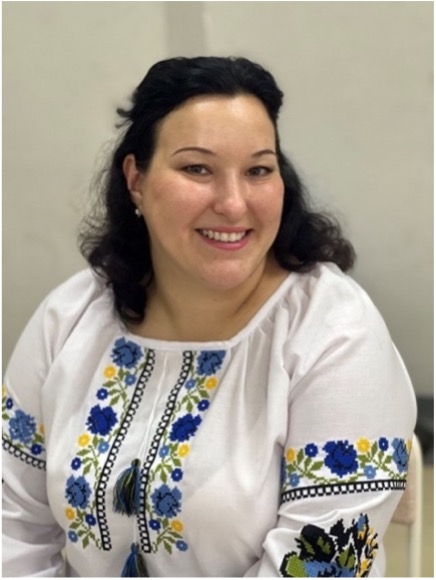
The Problem and Motivation Behind
“I had always dreamed of baking not just for my family, but for others … I wanted to give people joy and high-quality products—cakes, sweets, carved fruits, decorated tables.” – Olga.
Olga Rogovska (35-year-old) is a trained social worker and university lecturer who was forced to flee her home because of the war, leaving behind her career and sense of stability. In Georgia, she faced the challenges of displacement and uncertainty. To cope and rebuild, Olga turned to a long-held dream—opening a bakery. She began baking from home under the name Sweet Biscuit, combining her love for baking with a deeper mission: to reconnect with her community and regain a sense of purpose.
The Innovative Solution
“I didn’t just want to sell food. I wanted to give people the feeling of home. … I started getting messages from people saying my cake reminded them of their mother’s kitchen, or a birthday back home … That gave me shivers. I never imagined that something as simple as a cookie could mean so much.” – Olga.
When Olga joined the Youth Innovation Lab, Olga chose to act upon her dream, opening her bakery. She designed her business around what her community missed most— traditional Ukrainian pastries that had familiar tastes and emotional connection for her displaced community of Ukrainians. Her bakeries quickly grew a loyal client base, including both Ukrainians and local Georgians. It also became a point of connection—people gathered not just to place orders, but to talk, share traditions, and organise cultural events.
For Olga and her family, Sweet Biscuit has been a source of healing. “It helped us come together. We stopped focusing on what we had lost and started building something new,” she said. Today, Sweet Biscuit is more than a bakery. It is a hub of emotional support and cultural exchange, bringing people together. Ukrainian families gather at her events, exchange tips, and celebrate national holidays with Olga’s bakeries on the table.
Lessons Learned and Addressing Challenges
“Before joining the Lab, I had never heard of business models or Canvas …. The most important thing wasn’t the grant—it was the knowledge, support, and constant encouragement from my mentors. Without them, I wouldn’t have been able to launch it at this level.” – Olga.
The Youth Innovation Lab provided Olga with a seed grant, training, and ongoing mentorship. Through this support, she learned how to develop business strategies, manage her finances, and promote her brand effectively. The mentorship played a particularly meaningful role in her journey. “The mentor was more than a coach—she was like a psychologist. She helped me open up and start thinking about the future again,” Olga said, reflecting on the support she received from one of mentors.
Reflecting on her experience, Olga identified two major lessons learned:
- Scaling a business requires infrastructure and financial planning: To expand her bakery, Olga needs a certified kitchen, which comes with high costs. “Right now, my resources don’t allow me to rent or equip a certified facility,” she explained. Finding a suitable space and securing the necessary licenses continue to be major challenge. One of the key lessons from Olga’s journey is that growth takes more than passion—it requires proper infrastructure and financial planning.
- Building Trust Takes Time: Another challenge Olga faced was building a loyal client base. “You have to let people try your product, find your target audience, and prove your value,” she said. It took time and consistent effort to gain customers’ trust. But her perseverance paid off.
Next Steps and Future Aspirations
“This is not just a dream—it’s a plan.”
Olga is currently undergoing further training in business promotion with the goal of expanding into the Tbilisi market. She wants to establish a licensed bakery space, grow her product line, and reach more clients.
But her vision goes beyond business growth. She hopes to create a small community kitchen where other displaced women can learn baking skills, build confidence, and start their own ventures.
“I’ve always been someone with a lot of empathy,” she said. “Now I see how business can be another way to care for people—to help them feel at home, even when they’re far from it.”